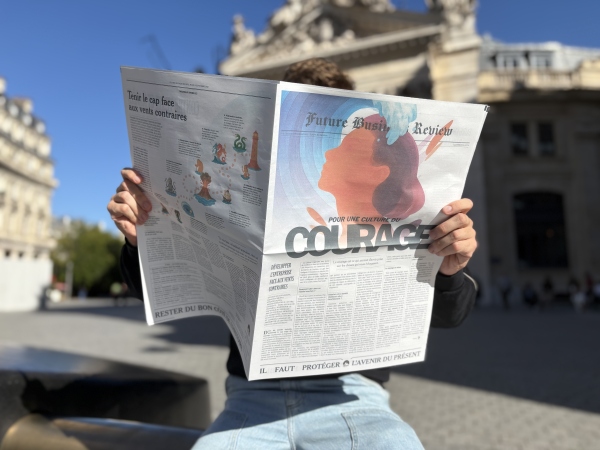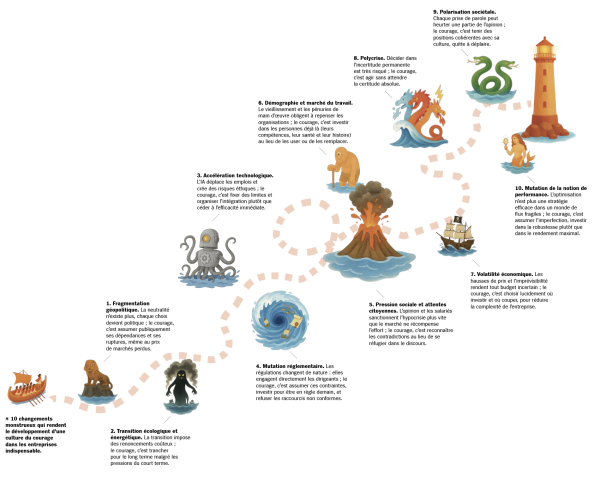In an unstable world, staying the course requires courage. The polycrisis, geopolitical fragmentation, ecological and energy transitions, technological acceleration, public pressure, a transformed labor market, economic volatility, societal polarization, and the very mutation of the concept of "performance" make any serious prediction impossible. Never has the world seemed so uncertain.
This climate breeds a loss of trust in institutions, scatters our attention, paralyzes action, and freezes budgets. Internally, it encourages authoritarian thinking: "When colleagues can no longer trust each other, they just follow orders from above."
How Can You Build in an Uncertain World?
Instead of following their culture—the heritage from which innovation emerges, the path forged by founders, or a core mission—companies are giving in to imitation, benchmarking, and micro-trends. In doing so, they are giving up their own voice, their identity, and their convictions. In a state of panic, they start "doing things that aren't like them." Customers are disappointed, and employees feel betrayed. As Seneca said, "If a man knows not to which port he sails, no wind is favorable." But how long can we zig-zag without consequences? When chasing the latest trends replaces strategy, we condemn ourselves to the short term. The more moves we make, the more we weaken the bonds that ensure trust.
On the contrary, companies must rediscover integrity and permanence. What guarantees this permanence is culture: an "elastic playbook" that allows a company to transform without betraying its core self. This culture maintains the company's cohesion, protects it from the risk of its identity fracturing, and safeguards its uniqueness.
How Much Can Your Identity Withstand Being Pulled Apart?
How do you preserve this culture when everything is changing? You obviously have to adapt: innovate, conquer new niches, rise to the occasion in booming markets, downsize, pivot, and manage cash flow. For these decisions to be strategies for preservation and sustainable performance—rather than acts of desperation or surrender—they must emerge from a culture of courage developed within the company.
Courage is the force that flows between value and virtue. In its warrior form (bravery, boldness), it strengthens the group, thereby rebuilding trust and even influencing the course of events by galvanizing allies. But it is also a virtue that guides human action in the face of fear or adversity, danger or pain. It allows one to maintain behavior deemed "just" by the community and guarantees continuity for the benefit of the group, protecting it against destabilization strategies (like "flooding the zone"), monstrous market reversals, or political deception.
This need for courage is a direct response to our era's inability to predict the future. Futurists have a short "History of the Future." For antiquity and the Renaissance, the future was knowable in advance: it was written but could not be changed. The oracle can do nothing for Oedipus, but the scientist, by mastering natural laws, can anticipate it. Since the end of the 20th century, we have known that the future cannot be predicted because it is not yet written. This means it can be prepared for through human action. Courage is precisely what allows us to get a grip on the things that are beyond our control.
Rather than trying to control the tidal wave of problems, a company can instead remain faithful to its promises—even if the result isn't guaranteed—and continue what it started. Not because it is certain it will work, but because doing so makes its actions possible and understandable to others.
Courage in Action
Three strategic acts of courage should be in every leader's playbook.
- First, stay the course in the face of headwinds. Persevere with your business model while exploring its limits in order to strengthen and adapt it to real-world constraints. Maintain a long-term effort, resisting the siren call of flash-in-the-pan trends, new organizational fads, and short-lived revolutions. Perseverance allows you to shape your environment rather than be shaped by it, gaining mastery over your own destiny.
- Second, make your voice heard in the storm. To maintain your uniqueness, say no. It is these "strategic sacrifices" and the refusal to drift off course that will make the collective direction clear and prevent teams from losing focus.
- Finally, know how to turn internal misalignments into a force for change. "Make commitments" by taking visible actions and making clear choices, however small, to build a common direction through debate. Loyalty creates trust, which will support the organization through the chaos of the storm.
It Is Strategic to Be Ethical
What a company does today determines the future it will have. And for it to do the "right" things, it needs a culture of courage—a courage for daily decision-making, for taking responsibility, and for genuine involvement.
By staying on the right side of history, against all odds, a company shows that integrity is always possible, even in a world facing disintegration. Through its example, it gains the power to influence how its competitors, employees, suppliers, customers, and shareholders see and value it.
The human domain that covers this situation, long relegated to the background of business vocabulary, is now unavoidable: it's called ethics. Your behavior today—your refusals, your perseverance, the moments you stand firm against the tide—will determine the level of responsibility your teams show tomorrow and the strength of the relationships between your partners and your products. It is now strategic to be ethical.




